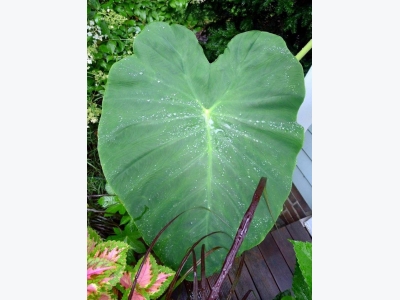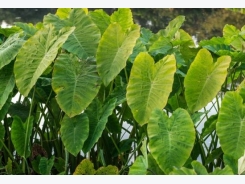Are Elephant Ear Plants Poisonous?

Here’s a puzzle for you: what plant is toxic, yet serves as a major food source for many countries in Asia? The answer: Colocasia, also known as elephant ear or taro. In many parts of the world, taro is a major food crop for both people and farm animals. The plant is traditionally served at Hawaiian luaus and the corms form the basis for poi, a favorite Hawaiian dish. Yet, elephant ears contain calcium oxalate, or oxalic acid, the same toxin found in rhubarb and Dieffenbachia leaves. This chemical compound contains sharp crystals that can cause serious illness and even in death if consumed in large amounts.
So, what’s going on here? How can a poisonous plant provide food for people all over the world? First, the plant is always eaten cooked, rather than raw. Cooking it breaks down the crystals, rendering them harmless. Additionally, some species are more toxic than others and the plants used as a food source are not necessarily the same varieties found in your yard.
ELEPHANT EAR PLANT SAFETY
Although elephant ears are not as toxic as Dieffenbachia, it’s a good idea to be careful, especially if you have young children or pets. The leaves and stems are the most toxic parts of the plants. Even touching them can cause skin irritation and itching, and if you get the sap in your eyes, your eyes will sting and burn for several hours.
If your child or pet ingests the leaves, the first symptoms are a tingly or burning feeling in the mouth or lips. Elephant ear poisoning is rarely fatal, unless large amounts are eaten. Below are some of the other symptoms associated with this plant:
- Severe burning or redness of the eyes
- Severe burning of the tongue, lips and mouth
- Swelling of the tongue, lips and eyes
- Diahrrea
- Nausea
- Vomiting
FIRST AID
If you suspect your child has ingested elephant ear leaves, call your local poison control center or the national poison control hotline at 1-800-222-1222. Don’t force vomiting, but keep your child calm and wipe out her mouth with a cool, wet cloth. Flush the eyes with water if they’re stinging. If your child’s lips or mouth begin to swell, call 9-1-1 or head to the nearest emergency room. If your pet eats elephant ears, contact your vet right away.
PREVENTION
If you love elephant ear plants, but you’ve got young children or pets, you might try a few strategies to prevent accidental poisoning. First, place the plants where they’re out of reach. Grow the plants in the front yard, rather than the backyard, where children and pets are more likely to play. Teach your kids not to touch or eat any plant in the yard. Another option would be to grow smaller varieties of elephant plants in hanging containers. Just be sure to remove any fallen leaves promptly!
OTHER OPTIONS
Sometimes it’s better to err on the side of caution. If you’re worried about your child’s or pet’s safety, replace elephant ears with non-toxic substitutes. Many other plants will give you the feel of the tropics, but are perfectly safe for children and pets. Below are a few to try:
- Acajou (Flame African Violet, Flame Violet, Red Violet)
- American Rubber Plant
- Arrowroot (Canna Lily, Common Garden Canna)
- Bamboo Palm
- Bamboo Vine
- Banana (Plantain)
- Big Leaf Paper Plant
- Boston Fern
- Bromeliad
- Canary Date Palm
- Cane Palm
- Christmas Dagger
- Cocks Comb
- Crisped Feather Fern
- Dwarf Date Palm
- Elephant Foot Tree
- Fishpole Bamboo
- Fortunes Palm
Có thể bạn quan tâm
Phần mềm

Phối trộn thức ăn chăn nuôi

Pha dung dịch thủy canh

Định mức cho tôm ăn

Phối trộn phân bón NPK

Xác định tỷ lệ tôm sống

Chuyển đổi đơn vị phân bón

Xác định công suất sục khí

Chuyển đổi đơn vị tôm

Tính diện tích nhà kính

Tính thể tích ao hồ



 Diseases of Zucchini Plants
Diseases of Zucchini Plants  When to Plant Elephant Ear Bulbs
When to Plant Elephant Ear Bulbs